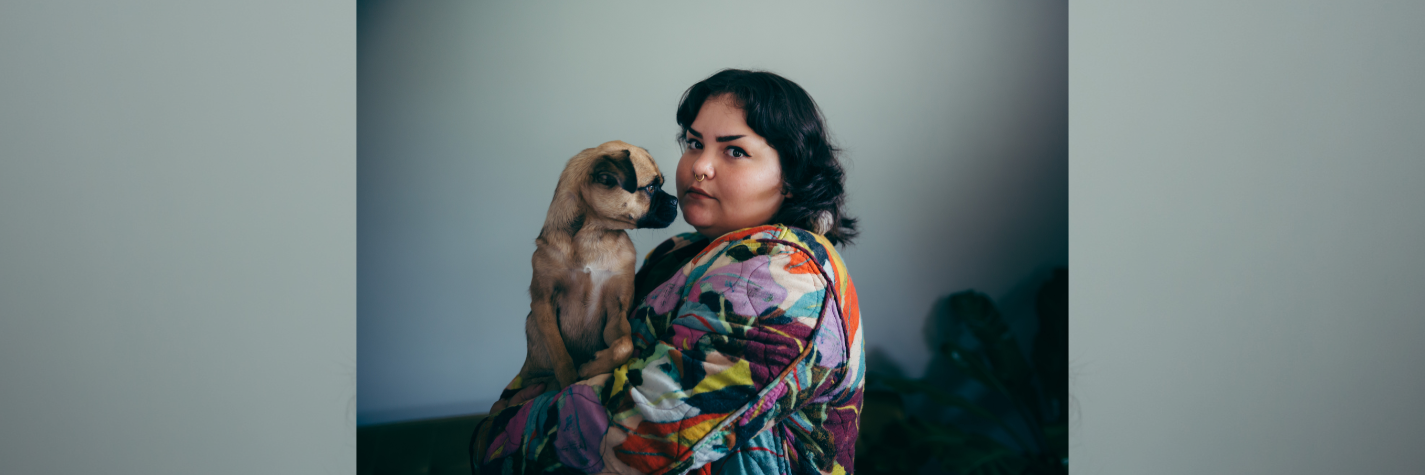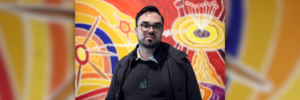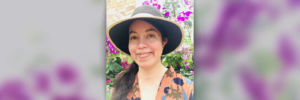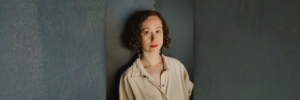
Photo by Ebony Lamb
Kōtuku (Te Ātiawa, Ngāti Tūwharetoa, W̱SÁNEĆ) currently lives on the Kāpiti Coast but has roots in both Aotearoa and Turtle Island. Her Adam Foundation Prize-winning novel that grew out of the gap between these places is a genre-defying work that bridges islands, generations, cultures, and histories.
Sometimes writers talk about their book as if it is something they’ve birthed – a struggle as well as a gift. Tauhou is so original, but if you were to think of it in this way who are its whanaunga?
There are definitely many creative works that helped me create the world of Tauhou and who I now consider its whanaunga. In terms of form, Tanya Tagaq’s Split Tooth was incredibly important. It completely changed the way I thought about fiction, memoir, retelling stories, and myth. Another important text was Smoke Signals (1998) by Chris Eyre which is funny and sweet but also cuts to the crux of Indigenous masculinity and fatherhood.
As the character Thomas recites at the end of the film:
“How do we forgive our fathers? Maybe in a dream. Do we forgive our fathers for leaving us too often, or forever, when we were little? Maybe for scaring us with unexpected rage, or making us nervous because there never seemed to be any rage there at all? Do we forgive our fathers for marrying, or not marrying, our mothers? Or divorcing, or not divorcing, our mothers? And shall we forgive them for their excesses of warmth or coldness? Shall we forgive them for pushing, or leaning? For shutting doors or speaking through walls? For never speaking, or never being silent? Do we forgive our fathers in our age, or in theirs? Or in their deaths, saying it to them or not saying it. If we forgive our fathers, what is left?”
Connie Walker’s podcast series Missing and Murdered, Stolen, and Surviving St. Michael’s have been incredibly important to all of my writing projects and she remains one of the most important inspirations to even beginning the project that became Tauhou.
Alison Whitakker’s Blakwork is certainly a cousin of Tauhou. I didn’t read it until after I finished the first draft of Tauhou, but the parallels and artistry of Whitakker’s mahi are astounding. I felt completely seen by her writing, even though we come from very different places, she captures Indigenous experience in such a stunning way in her poetry, essay, and prose.
What tikanga or kawa do you apply to your writing process?
I’m still in the process of figuring this out! Generally, I try to keep my research separate from my personal life since I am often dealing with sensitive documents and histories. Otherwise, I back myself the whole time and let the writing come first. I try my best to avoid conflict, especially around writing topics, because I find it often interferes with the quality and quantity of work I produce.
What do you think your tīpuna would think of your book? What would their reactions be?
I am not sure at all what they would think! I would hope they can see me reaching out toward them at the very least and know that I am using all the skills in the basket they wove me.
The concept of your pukapuka is so original, however, your writing is so sharp that for readers, it is easy to accept and feel immersed in the authenticity of this ao hou. What was the process of creating and building this world like for you?
It was very instinctual to be honest. The base of the world for me was my experiences with the natural world, both here in Aotearoa and in Turtle Island. The land was often my only connection to my identity because of the fractures within my family. As a child, most of the things I noticed around me were emotional atmospheres (particularly in my biological father’s household) and the natural wonders of British Columbia, especially the Saanich Peninsula. My connection with the whenua of Aotearoa wasn’t cemented until I was an adolescent/young adult. I combined the things I loved most about both landscapes and then filled things in-between: Indigenous pop culture, myths and legends, wonderings about alternate family realities, the past, what was and what will be.
Some of the kaupapa which feature in Tauhou are heavy, as is often the case with stories of colonisation and reclamation. What processes do you recommend having in place for other writers wanting to delve into taumaha subject matter?
This is actually a big focus on the PhD I started this year. I definitely advise caution when writing about this stuff, especially when working with primary sources like other people or even writing/documents from the period you are investigating. There were certainly times where I hurt myself by charging forward, looking to uncover things. I learned so much and there’s still more to discover, but I had to stop my historical research. It made me sick, mentally and spiritually, and eventually even progressed to physical pain. Some things have a time and place to be uncovered, but I think there’s no guarantee that it will be safe for the author or the people involved.
This kind of mahi is a good opportunity to fall back on the tikanga of your people, your family, yourself, or even your therapist. Make use of the resources that strengthen and fortify yourself, because it isn’t healthy to let this hurt and knowledge float freely throughout your life. Solidify your connections to your past and people by engaging in the living, joyful aspects of your culture where you can. For every piece of difficult subject matter, make yourself a beautiful meal, spend time with loved ones, or create something new. Ideally, I’ll be writing a lot about this in my thesis.
One of my favourite things about Tauhou is its fluidity. The writing effortlessly navigates across narratives, time and space in a way that is so intelligent and eloquent, yet accessible to a wide audience. When writing Tauhou was it difficult to balance this?
I tried to just let myself write initially. The pieces all came in their own time and many were lost or changed before the final draft. I would say most of the accessibility came with editing and revision, so that doesn’t need to be a focus when you’re writing, at least initially. Someone with a new perspective will come along and help you make things more clear later on.
Tauhou is published by THWUP, and is also set to be released by House of Anansi in so-called Canada. How has your experience been as an Indigenous writer within the mainstream publishing system and did the experiences across the two publishers differ greatly? How are you feeling about Tauhou’s reception in so-called Canada?
Te Herenga Waka University Press was my only choice in Aotearoa from the beginning. Both of my parents have been published by them and for years have been very strongly supported by Fergus and the team. I felt comfortable handing the book off to them more than anyone else because I knew they would care for me as a person and let me retain complete control over my own mahi. I was also lucky to be able to request an editor, my dad Lawrence Patchett, to work with, which meant the editing process was handled as carefully as possible. He was aware of the personal nature of the book, the cultural background, and was able to assist with my reo as well. It also felt especially healing to finish the mahi with him, when the book (for me anyway) centres around coming to terms with the abuse my biological father inflicted on my family.
House of Anansi has been absolutely amazing. They are considerably larger than THWUP, so it was a bit shocking to suddenly be engaged with a huge team, but everyone has been extremely warm and so excited about the book. Anansi have published some of the best contemporary Indigenous writers, like Billy Ray Belcourt, Leanne Betasamosake, and Katherena Vermette. I felt really comfortable giving them the work, because I believed they would honour and do their best to care for it. So far, I can see they’ve poured an enormous amount of time and resources into promoting and creating the North American edition. The proofs look gorgeous and the book will be hardback (!!!!). It’s already listed online in places like Barnes & Noble which feels totally outrageous to me.
What are your dreams for this book?
The big one is selling enough that the publishers make back my advance haha!
But I also hope Tauhou opens up some room for other writers dwelling in margins or across borders. The book is a patchwork of places, times, and identities and I hope its publication means something to people it represents.
Even as a person Indigenous to Aotearoa, I still feel the ache and pull of another home. I hope Tauhou helps me visit my other home more often.
What projects are you working on now or hope to be working on in the future?
The big one is the doctorate I started at Te Pūtahi Tuhi Auaha o Te Ao (IIML). It has both a creative and a critical component. Hopefully, in two and half years I will have a new novel and a standalone critical work to share.
“Kōtuku is using Athabascan scholar Dian Million’s ‘Felt Theory’ to read and write contemporary Indigenous literatures. She wants to sift through Indigenous narratives for their experiential truths, examining the interplay of Native experience and different literary forms. She would like to investigate whether it is possible to establish a creative writing framework based on this use of felt theory, alongside kaupapa Māori and other Indigenous methodologies, which could offer relief to Indigenous students and academics in fields like creative writing, who may experience alienation or re-traumatisation.
For her creative component, Kōtuku is writing a novel in which she hopes to juxtapose these experiential truths with overt fictions—avoiding literary realism in favour of experimenting with the speculative, science fiction, horror, gothic, crime, and the surreal—in order to create tension, confusion, and feelings of displacement that mirror Indigenous postcolonial experience. The novel is separated into three sections, each following a different generation navigating the fallout of a race-based human experiment.”
Taken from: https://www.wgtn.ac.nz/modernletters/our-students/phd-profiles/kotuku-titihuia-nuttall
Which book by a Māori author have you read lately that you loved and what did you love about it?
Unfortunately, I haven’t had much time to read fiction recently. I just bought a copy of Colleen Maria Lenhan’s Kōhine, so that’s on my TBR. Mostly, I’ve been reading a bit of Sara Ahmed for my research and I have to say her work definitely crosses over into important spaces for Indigenous studies. Though her writing is academic it is very accessible and narrative.
What advice do you have for emerging Māori writers?
Maintain a good support group! Whether it is other writers or not.
Sometimes it’s nice to have people outside of the writing world to give you a bit of a reality check, or unadulterated support.
I would also say don’t worry about becoming any particular kind of writer. Although Indigenous authors are pressured to represent our communities and people, we’re usually just nerds with a pen and paper.
Write what you want, how you want.
Be cautious about what you share and with whom, we are all negotiating the heavy fallout of colonial violence. Sometimes, regrettably, we engage in lateral violence against one another.
Keep yourself safe and focus on your own mahi.
There is plenty of space for everyone.
The writing comes first.
We are ready and waiting for you when you arrive.




